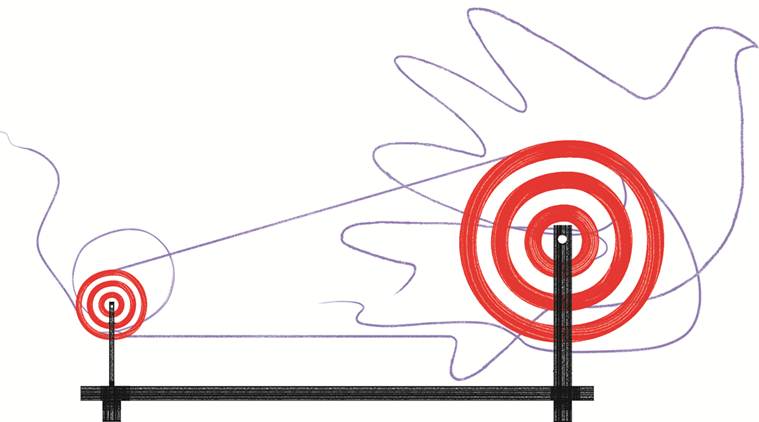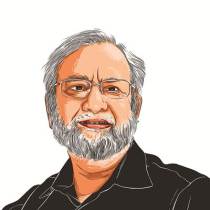Reaching for the Mahatma
There is anger and exhaustion in engaging with his writings. But most of all, he evokes awe with his commitment to truth, his ability to listen to others

Before beginning the padayatra Mahatma Gandhi had resolved to walk bare-foot in empathy with the poor villagers. (Illustration by: C R Sasikumar)
Reading Gandhi can be both exasperating and exhilarating. And elevating. You often feel exhausted with his fads about health like his staunch avowal for pure and simple life which meant, for instance, the tyranny of food without spices in his ashrams. He had a resistance to medicines and tried out on his son Manilal for nearly one-and-a-half months a “water therapy”, which he had either read about or “invented”. It is a relief to learn that Manilal finally recovered. One is enraged when, in the absence of toilet facilities in the house in South Africa, he forces Kasturba to carry their guests’ urine to dispose “with a smile on her face” as a mark of true seva; or feel angry at his having deprived his children of formal education and the effect it had on one of his sons, Harilal, who went through a series of travails, at Gandhi’s righteous justification despite his regrets. There would be umpteen such instances that would leave one confused and unsettled.
It is, however, the same man who stood facing a violent crowd baying for his blood during the terrible communal riots in Calcutta, during the days of Independence in 1947. He escaped a deadly assault when a heavy wooden danda thrown at him missed its target. And as Pyarelal recounts, the man who threw the danda eventually sought his forgiveness after peace was restored. In South Africa and later in India, he worked tirelessly to bring honesty into legal practice. He forgave those who assaulted him and refused to file court cases against them. One reads the diaries of his grandniece, Manu Gandhi, in rapt attention recounting in detail his daily padayatra which covered over a thousand miles; first across the rugged tracts of Noakhali in rural Bengal where the Hindus bore the brunt of an unprecedented violence, and then in rural Bihar, where Muslims suffered in a brutal backlash, to witness the remains of carnage and devastation in village after village ravaged by the worst communal riots.
Before beginning the padayatra he had resolved to walk bare-foot in empathy with the poor villagers. He had already abandoned stitched clothing for a dhoti and a chaddar from 1922 onwards during the campaign for the boycott of foreign goods. During the padayatra, he camped in makeshift huts and held daily prayer meetings, which began with recitations from Islamic and Hindu scriptures, where he would ask the perpetrators of violence to shun hate, and begged them to bring back their old neighbours who had fled the village. Pyarelal reports of the instances of people expressing remorse over their actions and receiving their old neighbours back into their fold.
Pulled away from these padayatras by the spectre of Partition, he returned to Delhi and lived in the Bhangi Colony from where he conducted his daily prayer meetings. There he was heckled by disgruntled men who objected to his inclusion of the Islamic along with all other prayers. He suspended the prayers until those present agreed to multi-religion prayers. He then began visiting refugee camps and urged his countrymen to return to sanity. And when nothing worked he resorted to his only weapon, of fasting, both to cleanse the soul and instil peace.
Going through accounts narrated by Pyarelal in Mahatma Gandhi, The Last Phase and Manu, in her daily diaries, one is left with the sense of trauma at the plight of the victims on both sides of the borders but also of incredulity at the actions of this one man who seemed to fight an oceanic tide of violence and hate that had engulfed the newly-independent nation. You even wonder if such a man did really exist. He had several forebodings of his assassination but he stood firm, often making jokes about it.
Reading his own account of South Africa and his autobiography is indeed an uplifting experience. The subtitle of his autobiography is My Experiments with Truth. The steadfast belief in truth was cardinal to his existence; and took on several aspects. These were manifest through an unwavering courage — moral, ideological or physical — in his personal and public life. I am not in the least surprised that those who came close to him must have felt a life-changing experience. Here was a man in flesh and blood, like any one of us, who stood by the ideals he cherished against all odds. He says he is no saint or Mahatma and he betrays all the human traits of fallibility and of grace, but above all, an unrelenting grit to fight all the forces of untruth and violence.
Reading Gandhi today leaves you in a state of total despair as the voices of sanity and civilised conduct in our public life have been extinguished, dissent muzzled, freedom curtailed. Even the detractors of Gandhi would agree that he respected the other, or any view or opinion that countered his own. He listened to those who disagreed with him, who objected to his methods or means, who often reviled him, upholding their right to differ with respect and humility. Manu wrote in her diaries that he continued to answer every mail he received, and would even refer to the hate-mail he received in his daily prayer meets.
My friend, historian Sudhir Chandra, described the Gandhi phenomenon as an impossible possibility. Gandhi has begun to matter more as the world he left behind has turned increasingly more violent. Hardly a day passes without the news of violent happenings the world over. There is no need to describe these happenings as we all know they occur with relentless continuity. What would he have done if he were alive today? Sceptics might say he would have been assassinated in the first instance of facing this violence with his ahimsa. Since he is no more, the question would be about the idea of Gandhi. Some would say, that we have already killed it.
Sheikh is an artist, writer and teacher







































No hay comentarios:
Publicar un comentario